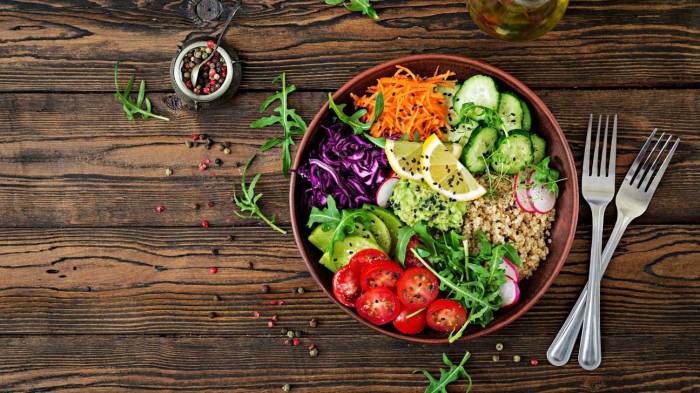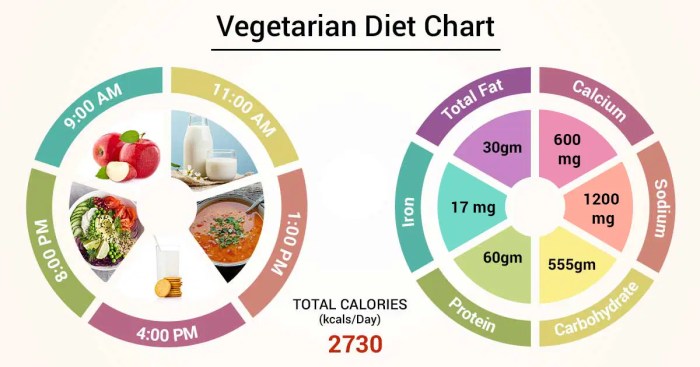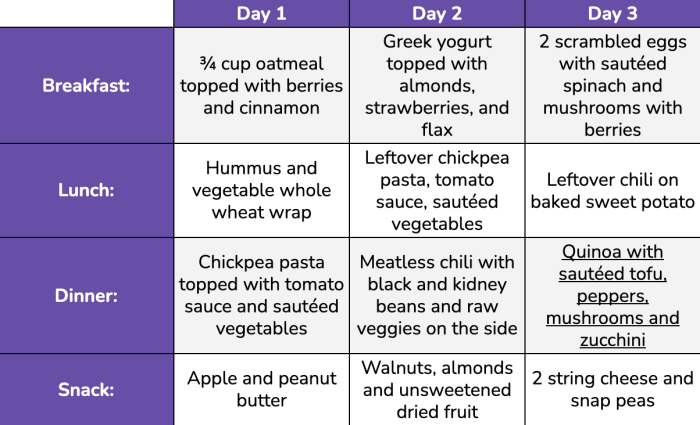Embark on a culinary adventure with our comprehensive guide to vegetarian daily diet. Discover the secrets of a plant-based lifestyle, from essential nutrients to meal planning, and uncover the health benefits that await you. Prepare to transform your plate and your well-being with this insightful exploration into the world of vegetarianism.
With a focus on nutritional adequacy, this guide empowers you to craft a vegetarian diet that meets your body’s needs. We’ll delve into protein sources, iron absorption techniques, and the importance of vitamin B12 supplementation. Plus, our sample meal plan and food substitution table will make mealtime a breeze.
Nutritional Considerations
A vegetarian diet, while providing numerous health benefits, requires careful attention to ensure adequate intake of essential nutrients. Understanding the specific nutrient needs and how to meet them is crucial for maintaining a healthy vegetarian lifestyle.
Key nutrients to consider in a vegetarian diet include protein, iron, calcium, and vitamin B12. Protein is essential for building and repairing tissues, while iron is vital for oxygen transport. Calcium supports bone health, and vitamin B12 is necessary for neurological function and red blood cell production.
Protein
- Plant-based protein sources include legumes (beans, lentils, chickpeas), tofu, tempeh, nuts, and seeds.
- Combining different plant-based protein sources throughout the day helps ensure a complete amino acid profile.
Iron
- Iron is found in leafy green vegetables, fortified cereals, and legumes.
- Vitamin C enhances iron absorption, so consuming iron-rich foods with citrus fruits or juices is recommended.
Calcium
- Dairy products are a rich source of calcium, but fortified plant-based milk, leafy green vegetables, and tofu can also provide calcium.
- Vitamin D aids calcium absorption, so ensuring adequate sunlight exposure or consuming fortified foods is important.
Vitamin B12
- Vitamin B12 is primarily found in animal products, making it essential for vegetarians to consider supplementation.
- Fortified foods, such as plant-based milk and nutritional yeast, can provide some vitamin B12.
If supplementation is necessary, consulting a healthcare professional is advisable to determine the appropriate dosage and type of supplement.
Meal Planning
Meal planning is essential for vegetarians to ensure they consume a balanced and nutritious diet. By planning ahead, vegetarians can make sure they get all the nutrients they need while enjoying a variety of delicious and satisfying meals.
Here is a sample vegetarian daily meal plan that provides a variety of food groups and nutrient-rich options:
Breakfast
- Oatmeal with berries, nuts, and seeds
- Whole-wheat toast with avocado and sprouts
- Yogurt with fruit and granola
- Smoothie made with fruits, vegetables, and plant-based milk
Lunch
- Lentil soup with a side of whole-wheat bread
- Salad with grilled tofu, quinoa, and vegetables
- Vegetarian chili with cornbread
- Sandwich on whole-wheat bread with hummus, vegetables, and sprouts
Dinner
- Stir-fry with tofu, vegetables, and brown rice
- Pasta with marinara sauce and vegetables
- Vegetarian tacos with beans, vegetables, and salsa
- Lentil shepherd’s pie with a mashed potato topping
Snacks, Vegetarian daily diet
- Fruit
- Vegetables
- Nuts
- Seeds
- Yogurt
Here are some tips for meal prepping and ensuring nutritional adequacy:
- Plan your meals ahead of time to make sure you have healthy options on hand.
- Cook in bulk to save time and have leftovers for lunch or dinner the next day.
- Freeze leftovers to have healthy meals on hand when you’re short on time.
- Make sure to include a variety of food groups in your meals to ensure you’re getting all the nutrients you need.
- If you’re not sure if you’re getting all the nutrients you need, talk to a registered dietitian or other qualified healthcare professional.
Food Sources and Substitutes

A vegetarian diet excludes meat, poultry, fish, and seafood. As a result, it is crucial to find alternative sources of essential nutrients, particularly protein. Plant-based foods offer a wide range of protein options, ensuring that vegetarians can meet their daily protein requirements.
Pescatarian, a diet that includes seafood but excludes other animal products, offers a unique way to nourish your body. To help you get started, check out this comprehensive pescatarian meal plan week. It provides a structured guide with delicious recipes and helpful tips to support your pescatarian journey.
Legumes, such as beans, lentils, and chickpeas, are excellent sources of protein. They are also rich in fiber, vitamins, and minerals. Tofu and tempeh are processed soy products that provide a complete protein profile, making them ideal meat substitutes.
Nutritional Content of Vegetarian Protein Sources
The following table compares the nutritional content of common vegetarian protein sources:
| Protein Source | Protein (g/100g) | Fiber (g/100g) | Iron (mg/100g) | Calcium (mg/100g) |
|---|---|---|---|---|
| Beans | 21 | 15 | 5 | 140 |
| Lentils | 26 | 12 | 7 | 100 |
| Chickpeas | 19 | 17 | 4 | 100 |
| Tofu | 17 | 2 | 3 | 100 |
| Tempeh | 19 | 3 | 5 | 100 |
Meat Substitutes
Meat substitutes are plant-based products designed to mimic the taste and texture of meat. They are typically made from soy, wheat, or pea protein. Meat substitutes can be a convenient and flavorful way to add protein to a vegetarian diet.
However, it is important to note that meat substitutes often have a higher sodium content than meat. Therefore, it is advisable to consume them in moderation and to choose products that are low in sodium.
Health Benefits: Vegetarian Daily Diet

A vegetarian diet offers numerous health advantages. Studies have shown that vegetarians have a lower risk of developing chronic diseases such as heart disease, stroke, and certain types of cancer.
Vegetarian diets are typically rich in fruits, vegetables, whole grains, and legumes, which are all excellent sources of fiber, antioxidants, and phytochemicals. These nutrients have been linked to a reduced risk of various health conditions.
Heart Disease
- A vegetarian diet can help lower cholesterol levels and reduce the risk of heart disease. Plant-based foods contain no cholesterol, and they are rich in fiber, which helps to reduce cholesterol absorption in the body.
- Studies have shown that vegetarians have a lower risk of developing heart disease than non-vegetarians. For example, a study published in the journal “Circulation” found that vegetarians had a 24% lower risk of developing heart disease than non-vegetarians.
Stroke
- A vegetarian diet can also help to reduce the risk of stroke. Fruits, vegetables, and whole grains are all good sources of potassium, which helps to lower blood pressure. High blood pressure is a major risk factor for stroke.
- A study published in the journal “Neurology” found that vegetarians had a 20% lower risk of developing stroke than non-vegetarians.
Cancer
- A vegetarian diet may also help to reduce the risk of certain types of cancer, such as colon cancer, prostate cancer, and breast cancer. Fruits, vegetables, and whole grains are all good sources of antioxidants, which help to protect cells from damage.
- Studies have shown that vegetarians have a lower risk of developing certain types of cancer than non-vegetarians. For example, a study published in the journal “Cancer Research” found that vegetarians had a 15% lower risk of developing colon cancer than non-vegetarians.
Weight Management
- A vegetarian diet can also help with weight management. Plant-based foods are typically lower in calories and fat than animal-based foods. Additionally, vegetarian diets are often high in fiber, which helps to promote satiety.
- Studies have shown that vegetarians tend to have lower body weights than non-vegetarians. For example, a study published in the journal “Obesity” found that vegetarians had a lower body mass index (BMI) than non-vegetarians.
Disease Prevention
- In addition to the specific health benefits mentioned above, a vegetarian diet may also help to reduce the risk of developing other chronic diseases, such as type 2 diabetes, Alzheimer’s disease, and Parkinson’s disease. Vegetarian diets are typically high in fiber, antioxidants, and phytochemicals, which have all been linked to a reduced risk of these diseases.
- Studies have shown that vegetarians have a lower risk of developing certain chronic diseases than non-vegetarians. For example, a study published in the journal “Diabetes Care” found that vegetarians had a 34% lower risk of developing type 2 diabetes than non-vegetarians.
Challenges and Considerations

Embarking on a vegetarian diet may present certain challenges, including social pressures and nutrient deficiencies. Understanding these obstacles and devising strategies to overcome them is crucial for maintaining a healthy vegetarian lifestyle. Consulting with a healthcare professional can provide personalized advice and support.
Social Pressures
Vegetarianism may sometimes face social disapproval or skepticism from non-vegetarians. Dining out or attending social events can involve navigating situations where vegetarian options are limited or met with judgment. To address this, it’s helpful to educate others about vegetarianism, suggest alternative dining options, and remain confident in your dietary choices.
Nutrient Deficiencies
A vegetarian diet requires careful planning to ensure adequate intake of essential nutrients, such as vitamin B12, iron, calcium, and omega-3 fatty acids. Vitamin B12 is primarily found in animal products, so vegetarians may need to consume fortified foods or supplements.
If you’re looking for a healthy and sustainable way to eat, a pescatarian meal plan week might be the perfect option for you. This type of diet focuses on eating fish and seafood, while limiting or eliminating meat and poultry.
It’s a great way to get the benefits of eating fish, such as omega-3 fatty acids, without the environmental impact of eating meat.
Iron is found in plant-based foods, but its absorption is lower than from animal sources. Calcium is abundant in dairy products, so vegetarians should consume calcium-rich plant foods like leafy greens and fortified plant-based milk. Omega-3 fatty acids, typically found in fish, can be obtained from plant sources such as flaxseed, chia seeds, and walnuts.
Final Thoughts
Whether you’re a seasoned vegetarian or embarking on a plant-based journey, this guide has something for you. Embrace the challenges and considerations that come with a vegetarian lifestyle, and learn how to overcome them with ease. Consult with a healthcare professional for personalized advice, and unlock the transformative power of a vegetarian diet.
Remember, every bite you take is a step towards a healthier, more sustainable you.
FAQs
What are the essential nutrients for a vegetarian diet?
Protein, iron, calcium, and vitamin B12 are crucial nutrients for vegetarians.
How can I ensure I get enough protein as a vegetarian?
Legumes, tofu, tempeh, nuts, and seeds are excellent plant-based protein sources.
Is vitamin B12 supplementation necessary for vegetarians?
Yes, vitamin B12 is primarily found in animal products, so supplementation is often recommended for vegetarians.